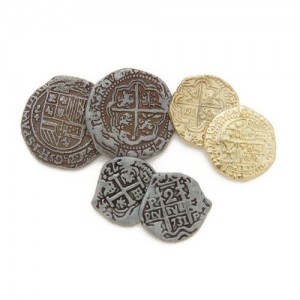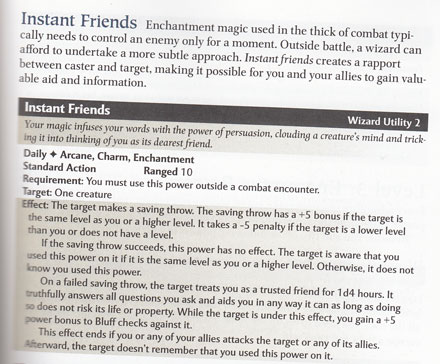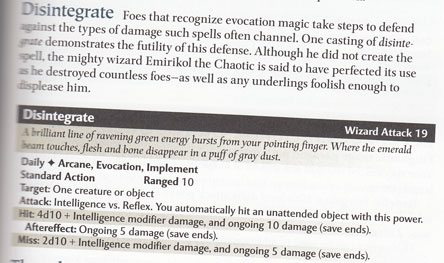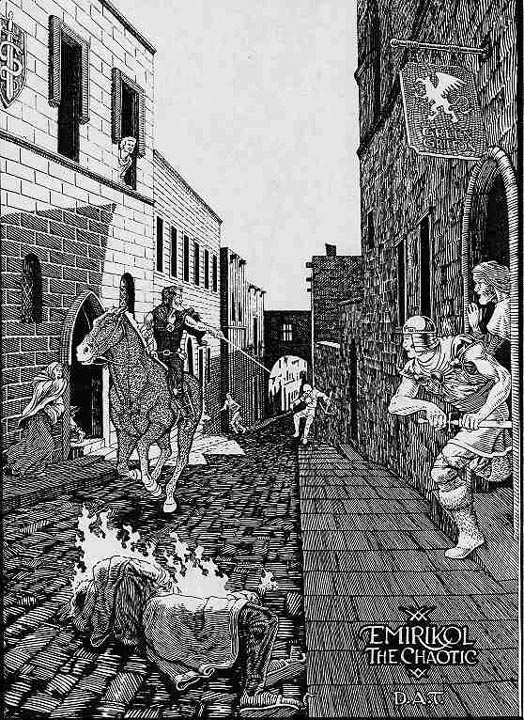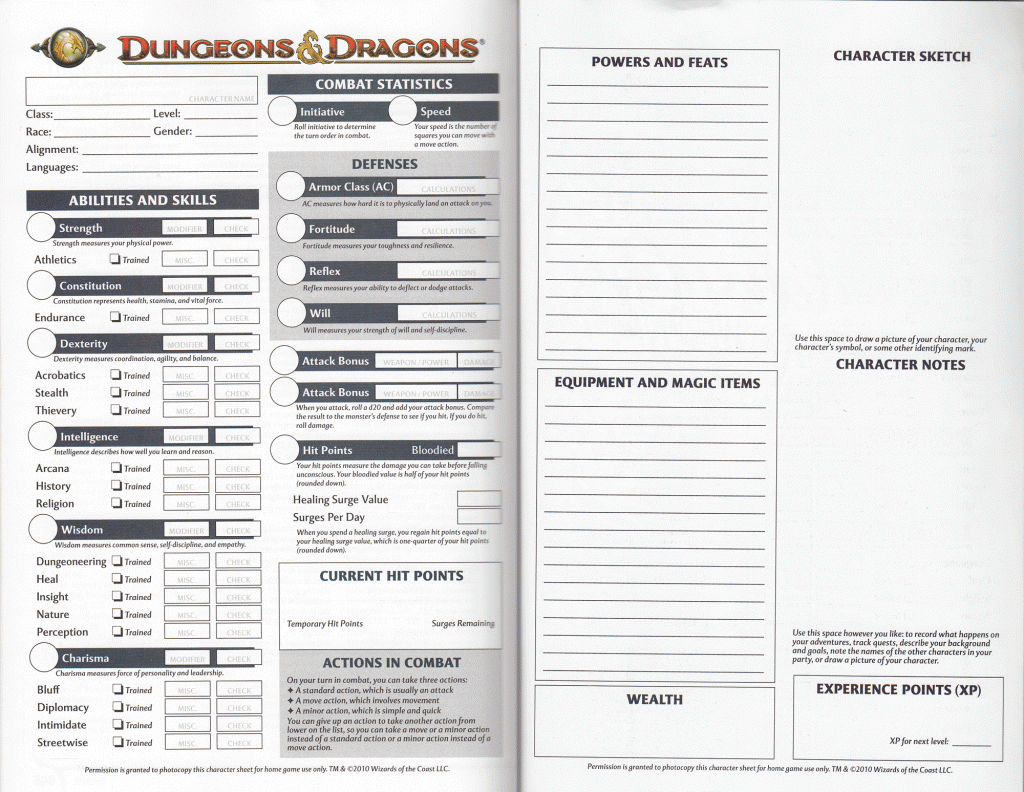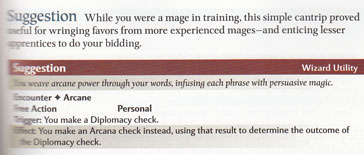Expertise Feats
Heroes of the Fallen Land offers a slew of new expertise feats and a change to weapon focus to limit it only to implements (while simultaneously bringing in implement focus to the mix). Consequences below:
- More Errata Anyone?: Expertise feats released prior to HotFL increased to a +2 bonus at 15th level and a +3 bonus at 25th level, where as these new ones increase at 11th and 21st. This leaves people with weird implements, such as tomes, or people who use multiple implements and want to take advantage of versatile expertise, in an annoying situation of waiting several levels to catch up to their fellow players using trendier implements and weapons. Obviously this an oversight that any DM with brains will house rule, but it probably should be errata’d for official events and the like.
- Racial Powers: A minor gripe, but I always think of it when a new expertise feat comes out. Racial powers are still left in the dust, falling 1-3 points behind the attack rolls of other powers since they have no applicable expertise feats to help them.
- Hello Implement Focus!: This is a feat spell casters have been waiting a long time to get. Coordinating the ability scores and the powers needed to get any use out of the energy boosting damage feats was a chore that usually couldn’t work out and wasn’t worth a relatively modest boost to damage. Implemented Expertise makes it simple.
- Where is the love for weapon/implement dependency?: A lot has been done for classes that rely, or choose to use, multiple implements and weapons as part of their build. For example, there are several weapons available, such as the bard’s songblade, that count as a weapon and an implement, thus eliminating the need to purchase/discover an extra magic item. HotFL come out with a very nice expertise feat, Master at Arms, that allows a warrior to get a bonus to attacks with all weapons, without having to grab up a bunch of new feats. Unfortunately, the focus feats still miss the mark, and the recent change to weapon focus has taken away the ability to snatch an easy damage bonus for a weapon used both as a weapon and an implement (such as a pact blade or songblade). It’s a fairly minor bonus, sure, probably 5-10% of the damage you do, but it’s not entirely unconsequential, and it would be nice to be able to add damage to both types of attacks without having to take an extra feat.
- House Rules: A house rule I’ve been using, which I understand is in use by some folks from WotC as well, is to give everyone a special version of expertise that gives a feat bonus that scales with level to all attacks. The reasoning is that expertise is a 100% must have feat that seems like it was put in more to fix a numbers issue with monster defenses increasing too swiftly relative to PC attack bonuses than any other compelling reason. With the advent of all these new expertise feats, I’m trying to decide what to do! I think I might experiment with allowing someone to swap in one of these feats in place of my generic expertise feats. This way, if they really do plan on ultra-specializing with one weapon or implement (which probably 75% of all classes do), they can take one of these feats. If they want ultimate flexibility with weapons, implements, and racial powers, they can keep my made-up feat.
Other Feats
Aside from the expertise feats and implement focus, which I’ve already covered, there are some pretty BOSS feats in Heroes of the Forgotten Lands! Highlights follow:
Disciple of Lore: This feats gives a +1 bonus to skills with which you have training. A pretty efficient feat when you consider how many skills can get the bonus, and fun for maxing out skills with all possible bonuses!
Improved Defenses: Wow, a feat that gives a +1 to all non AC defenses that scales with tier, making it twice as good as Paragon Defenses, which I almost always tried to take if at all possible! The only reason I could see for not taking this feat is that other superior feats for boosting specific defenses while giving other bonuses that I discuss below. Other than that, I suppose there are one or two classes that are so jam packed with crazy powerful feats, that they just don’t have time to take this one, but in my experience, those classes are few and far between.
Melee Training: An errata’d version of the old feat, which brings the power level down a bit. A necessary evil, to stop the purely dex based slayer and other potentially crazy builds with the new figher and rogue. A moment of silence, please, for all the builds that are taking a minor hit so that the warrior and rogue could use basic attacks as their only method of attacking…
Resilient Focus: Dude, I remember when only humans and half-elves could get a +2 bonus to Saving Throws and then only if they had spent an Action Point. Very close to being a must take for all classes by Paragon Tier (when status effects get nasty).
Superior Fortitude: Wow, a feat that gives +2 Fort AND resist versus ongoing damage that scales with tier! Why does it scale with tier anyway? This feat is noticably better than it’s paragon tier counterpart, which granted, never got taken.
Superior Reflexes: Another feat that combines two feats into one, giving a +2 to Reflexes that scales with tier and giving combat advantage against all enemies during your first turn in an encounter. Not amazing, but still a noticeable improvement!
Superior Will: This is one that I think anyone should seriously consider taking: a feat that gives a +2 bonus to will that scales with tier AND allows you to make a ST at the beginning of your turn to end the effect of being dazed or stunned. The three worst offenders as far as status effects are dazed, stunned, and dominated (at least, for those that come up with any kind of regularity). Making a save at the beginning of your turn to end two of those is HUGE.
Also, look how much better Swift Recovery is than Toughness:
Swift Recovery: You gain a +3 feat bonus to your healing surge value. The bonus increases to +4 at 11th level and +5 at 21st level.
Toughness: You gain 5 additional hit points. These additional hit points increase to 10 at 11th level and 15 at 21st level.
More Essentials thoughts…


